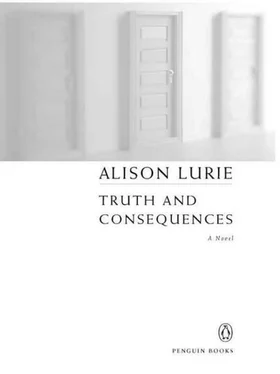As silently as possible, Jane closed the door.
The door of Charlie Amir’s office was open, and he was sitting at his desk rolling a yellow pencil about nervously.
“Professor Amir—”
“I know why you’ve come,” he interrupted. “I am very sorry, I am acting very wrongly.” Charlie Amir was a pleasant-faced young man, with curly light-brown hair and a short curly beard. Ordinarily his English was excellent, but Jane had noticed already that in a crisis (the breakdown of the copier, for instance) it began to fail.
“You’ve upset Susie very much.”
“Yes, yes,” he agreed.
“We can’t have that sort of thing here, you know,” she continued. “This isn’t Bosnia.”
“I do nothing like that in Bosnia, never anywhere, I swear by God,” Charlie protested. “I am very sorry, Mrs. Mackenzie, I have so much strain now. You know my wife, she went home this summer to see her family, and she was to come back now, to join me?”
“Yes, I know,” Jane said.
“But now she says on the telephone that she did not get a permit. Why does she say that, when already she has a permit?”
“I don’t know,” Jane said weakly.
“I know what you are thinking, you are thinking maybe she does not want to return to America.”
“No, I—”
“I am thinking this too. She is never happy here. And she has many friends who say to her two years ago, when I get the job in Ohio, do not go, America is an evil country. Her mother says this also, continuously.”
“I’m sorry,” Jane said.
“I don’t feel so good then, you know. It is always in my mind. So I do wrong, and I am very sorry, and also about the steps.”
“Steps? What steps?”
“Yesterday, when we were moving up the sofa, a pole of the steps was broken, by me. And I acted wrongly, I didn’t admit—I was afraid to lose my fellowship. But I told Susie this afternoon, she should give me the bill, and I will pay, but please not to tell anyone. And she is so kind, she says never mind, they will fix it anyhow, no need to pay. So I don’t know what happened, but I looked at her, and I wanted to embrace her, to thank her. I did not mean any harm.”
“Maybe not,” Jane said. “But you’ve upset Susie, and it’s got to stop. I won’t say anything more about it to anyone. But I have to tell you, there will be a report. And if there are any more incidents there could be an official inquiry, and sometimes this is a very unpleasant process.”
Charlie Amir visibly flinched and looked stricken, and Jane realized that in his country of origin her statement would probably have suggested something far harsher than a reprimand from the ombudsman or even the loss of a fellowship. “You threaten me,” he said bleakly.
“No, no. I only warn you,” Jane hastened to say, so rapidly that she found herself adopting Professor Amir’s diction. “Really.”
“I understand. I will be careful. Also I will apologize to Susie.”
“That’s a good idea. But maybe it might be better if you just wrote her a note.”
“You think?”
Jane nodded.
“Very well, I will do that.” For the first time, Professor Amir seemed to relax. “I am sorry that I have disturbed her, you know, she is so pretty and soft and kind. She is like the peaches in my country.”
And I’m not, Jane thought as she left the office. Well, too bad. Somebody has to have some backbone around here. But why does it have to be me? Why do I always have to do everything? An uneasy echo sounded in her head, of something Lily Unger had said, what? Yes, that Henry Hull did everything. But it wasn’t the same, Jane thought, because Delia didn’t need everything done, she wasn’t really ill.
But the result was the same. She was always tense and tired lately, probably because she had so much more work at home. Not only all the usual cooking and cleaning and shopping and errands, but everything Alan used to do: the dishes and the laundry and the household repairs, taking the newspapers and bottles and cans and trash out, dragging the garbage cans and recycling bins up the steep driveway to the road and then down again. And rewiring lamps and hanging the new shower curtain, putting up the storm windows, raking the leaves, unblocking the sink, changing the furnace filters, and replacing bulbs in ceiling fixtures. For a long while she had seen it as temporary. She had kept telling herself that for a while she would have to do these things, but then it would be over.
Because it wasn’t fair now, it wasn’t right. Though healthy, compared to Alan Jane was small and slight, barely five-foot-two. In the past one of the many things she had loved and admired about her husband was his height and strength: the easy, casual way he could lift heavy boxes of books and open bottles and reach things on top shelves. But last spring, when Alan went to have his operation, Jane had had to carry everything and drag both their suitcases and lift them onto the X-ray machine, while Alan just stood there, leaning on his cane and looking off into the distance as if he weren’t involved and had never even met her. He had probably been embarrassed; she recognized that. But the bottom line was that she had had to do everything on that trip and she still had to do everything, and though she shouldn’t, she resented it, and sometimes even showed this, and she was slowly but steadily turning into a mean, resentful person.
SIX
Outside Alan’s window at the Unger Center the sky was a bland blue, the maples a cheerful chrome yellow, and none of the people passing along the sidewalk were running or screaming. There was no sign that since last Tuesday the University, the town, and the nation had been in a state of shock. Over three thousand people had died in the World Trade Center, and as Susie Burdett, in the Center office downstairs, had put it, weeping, nowhere seemed nice and safe anymore.
Alan had agreed with her, without adding that for him this was not new—that nowhere had seemed nice and safe to him for the last eighteen months. Ever since the lizard moved into his back the world had been full of hazards: noisy gangs of students that might knock him over in the hallways; cars that might hit him as he slowly and painfully, leaning on his cane, made his way from the parking lot to his office; chairs and beds that were agony to sit or lie in; irregularities in the natural landscape that might trip him up and make his pain worse.
Alan had always thought of the World Trade Center as a rather banal structure; if in the past he had been asked whether it should be torn down for aesthetic reasons, he might have said yes. But its sudden destruction had affected him like a physical blow. Last Tuesday, alerted by a phone call from a colleague, he had stood in his sitting room watching a TV replay of that horrible and unbelievable event. As the first plane hit, he felt a sudden, much sharper pain in his back, exactly as if his spine were the inner armature of a skyscraper into which something had just crashed. He gasped for air, felt dizzy, and had to lie down on the sofa.
The president of the University and his colleagues in Knight Hall, predictably, had announced to what they sometimes called the Corinth Community (thus including both town and gown) that life and classes must go on—indeed that to cause them to go on was everyone’s patriotic and academic duty. Alan’s particular duty, apparently, as the senior Faculty Fellow at the Center, was to deliver his lecture on religious architecture, titled “Houses of God” and scheduled for that afternoon. In the light of the morning’s events it seemed totally irrelevant to him, and he had e-mailed the chairman of the Humanities Council, Bill Laird, to say so. Bill had e-mailed him back, agreeing and suggesting they reschedule the talk for the following week, at the same time quietly deploring the president’s speech.
Читать дальше







![Кэмерон Доки - Правда и ее последствия[Truth and Consequences]](/books/79610/kemeron-doki-pravda-i-ee-posledstviya-truth-and-con-thumb.webp)




